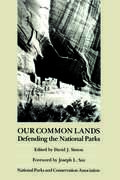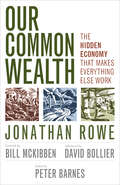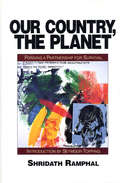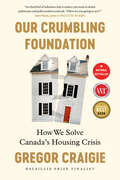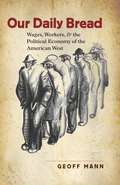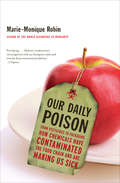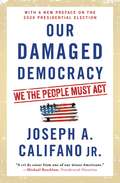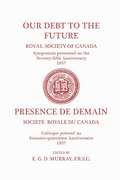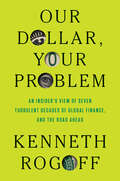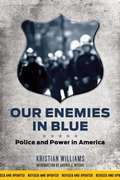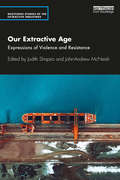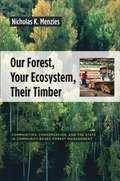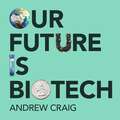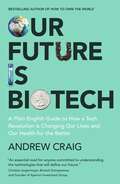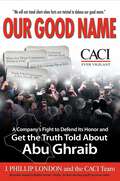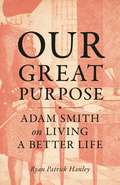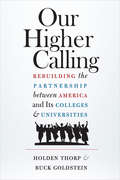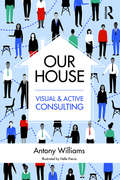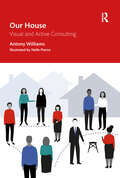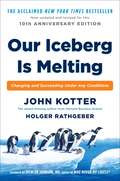- Table View
- List View
Our Common Lands: Defending The National Parks
by David J. Simon Joseph L. SaxThis accessible book explains the complexities of key environmental laws and how they can be used to protect our national parks. It includes discussions of successful and unsuccessful attempts to use the laws and how the courts have interpreted them.
Our Common Wealth: The Hidden Economy That Makes Everythig Else Work
by Jonathan RoweA huge part of our economy is invisible, invaluable, and under siege. This is &“the commons,&” a term that denotes everything we share. Some parts of the commons are gifts of nature: the air and oceans, the web of species, wilderness, and watersheds. Others are the product of human creativity and endeavor: sidewalks and public spaces, the Internet, our languages, cultures, and technologies. Jonathan Rowe illuminates the scale and value of the commons, its symbiotic relationship with the rest of our economy, its importance to our personal and planetary well-being, and how it is threatened by privatization and neglect. He unifies many seemingly disparate struggles—against pollution, excessive development, corporate marketing to children, and more—with the force of this powerful idea. And he calls for new institutions that create a durable balance between the commons and the profit-seeking side of our economy.
Our Country, The Planet: Forging A Partnership For Survival
by Seymour Topping Shridath S. RamphalOur Country, The Planet is a wide-ranging discussion of the global environmental crisis that accounts for the positions and perceptions of both developed and developing nations. As president of the World Conservation Union and the only person to have served on all five independent international commissions on global issues, Shridath Ramphal brings to his study a unique perspective and deep understanding of both development and the environment.
Our Crumbling Foundation: How We Solve Canada's Housing Crisis
by Gregor CraigieAn urgent and illuminating examination of the unrelenting housing crisis Canadians find ourselves facing, by Balsillie Prize finalist and CBC Radio host Gregor Craigie, Our Crumbling Foundation offers real-life solutions from around the world and hope for new housing innovation in the face of seemingly impossible obstacles.Canada is experiencing a housing shortage. Although house prices in major Canadian cities appear to have topped out in early 2023, new housing isn&’t coming onto the market quickly enough. Rising interest rates have only tightened the pressure on buyers, and renters, too, as rising mortgage rates cost landlords more, which are passed along to tenants in rent increases. Even with the recent federal budget commitment to bring more housing online by 2030, there will still be a shortfall of 3.5 million homes by 2030.Gregor Craigie is a CBC journalist in Victoria, one of the highest-priced housing markets in the country. On his daily radio show On The Island he's been talking for over 15 years to local experts and to those across the country about housing. Craigie has travelled to many of the places he profiles in the book, and in his interviews with Canadians he presents the human face of the shortfall as he speaks with renters, owners and homeless people, exploring their varying predicaments and perspectives. He then shows, through comparable profiles of people across the globe, how other North American and international jurisdictions (Tokyo, Paris, Berlin, Helsinki, Singapore, Ireland, to name a few) are housing their citizens better, faster and with determination—solutions that could be put into practice here.With passion, knowledge and vigour, Craigie explains how Canada reached this critical impasse and will convince those who may not yet recognize how badly our entire country is in need of change. Our Crumbling Foundation provides hope for finding our way out of the crisis by recommending a number of approaches at all levels of government. The prescription for how we&’re going to house ourselves and do so equitably, requires not just a business solution, nor simply a social solution.
Our Daily Bread
by Geoff MannA wage is more than a simple fee in exchange for labor, argues Geoff Mann. Beyond being a quantitative reflection of productivity or bargaining power, a wage is a political arena in which working people's identity, culture, and politics are negotiated and developed. In Our Daily Bread, Mann examines struggles over wages to reveal ways in which the wage becomes a critical component in the making of social hierarchies of race, gender, and citizenship.Combining a fresh analysis of radical political economy with a critical assessment of the role of white men in North American labor politics, Mann addresses the issue of class politics and places the problem of "interests" squarely at the center of political economy. Rejecting the idea that interests are self-evident or unproblematic, Mann argues that workers' interests, and thus wage politics, are the product of the ongoing effort by wage workers to focus on quality in a socioeconomic system that relentlessly quantifies. Taking three wage disputes in the natural resources industry as his case studies, Mann demonstrates that wage negotiation is not simply emblematic of economic conflict over the distribution of income but also represents critical contests in the cultural politics of identity under capitalism.
Our Daily Poison: From Pesticides to Packaging, How Chemicals Have Contaminated the Food Chain and Are Making Us Sick
by Marie-Monique Robin&“An enlightening and deeply disturbing account&” of the dangerous chemicals that have infiltrated our food, by the Rachel Carson Prize–winning journalist (Booklist). Our Daily Poison is &“a gripping and urgent book&” for anyone concerned about democracy, corporate power, or public health (Raj Patel, author of Stuffed and Starved). In it, award-winning journalist and filmmaker Marie-Monique Robin travels across North America, Europe, and Asia to document the shocking array of chemicals we encounter in our daily lives—from the pesticides that blanket our crops to the additives and plastics that contaminate our food—and their effects on our health over time. Following the trail of the synthetic molecules in our environment and our food, Robin traces the ugly history of industrial chemical production, as well as the shoddy regulatory system for chemical products that still operates today. Using scientific studies, expert testimony, and interviews with farmworkers suffering from acute chronic poisoning, Robin demonstrates how corporate interests—and our own ignorance—may be costing us our lives. &“What Rachel Carson&’s groundbreaking Silent Spring did for the environmental movement, Robin is doing for awareness of toxins in the food chain.&” —Publishers Weekly &“This may be one of the most important books of the year.&” —Kirkus Reviews &“Full of facts, stories, and wisdom.&” —The Huffington Post
Our Damaged Democracy: We the People Must Act
by Joseph A. Califano Jr.This authoritative and passionate primer on the three branches of government reveals the changes—political, cultural, constitutional, technological, institutional—that render our government completely dysfunctional, and the urgent need to fix our democracy before it’s too late.If you’ve been watching the news and worrying that our democracy no longer works, this book will help you understand why you’re right. There is colossal concentration of power in the Presidency. Congress is crippled by partisanship and dependence on special interest money. The Supreme Court and many lower federal courts are riven by politics. Add politically fractured and fragile media, feckless campaign finance laws, rampant income and education inequality, and multicultural divisions, and it’s no wonder our leaders can’t agree on anything or muster a solid majority of Americans behind them. With decades as a leader in government, law, and business, Joseph A. Califano, Jr. has the maturity to be party-neutral in his evaluation and the perspective to see the big picture of our democracy. Using anecdotes and examples featuring every modern president and actions of both parties, Califano makes the urgent case that we do not need to agree, but we do need to trust each other and be worthy of that trust, in order to bring back systems of government that protect freedom and promote fairness. The longer we wait to fix these problems, the more dangerous our situation will become. Our Damaged Democracy is the rallying cry we need to get our country back on track.
Our Debt to the Future: Royal Society of Canada, Symposium presented on the Seventy-fifth Anniversary 1957 (The Royal Society of Canada Special Publications #2)
by E.G.D. MurrayAT ITS ANNUAL MEETING in 1957, the Royal Society of Canada, celebrating the seventy-fifth anniversary of its foundation, departed from the accustomed pattern of its meetings. Instead of assembling in separate sections, Fellows from each Section of the Society were asked to contribute to a conspectus, focused by their specialized knowledge and trained discrimination, to reveal to the Society and to others certain trends and tendencies in Canada. Subjects and contributors are: "These Seventy-Five Years" (Presidential Address by W. A. Mackintosh); "The Roles of the Scientist and the Scholar in Canada's Future" (W. A. Mackintosh, David L. Thomson); "The Penalties of Ignorance of Man's Biological Dependence" (E. G. D. Murray, K. W. Neatby, I. McT. Cowan, G. H. Ettinger, R. H. Manske); "The Social Impact of Modern Technology" (N. A. M. MacKenzie, V. W. Bladen, E. W. R. Steacie, W. H. Watson); "Our Economic Potential in the Light of Science" (H. C. Gunning, J. E. Hawley, L. M. Pidgeon, B. S. Keirstead, Maurice Lamontagne); "Human Values and the Evolution of Society" (G.-H. Lévesque, T. W. M. Cameron, A. S. P. Woodhouse, R. Elie, Roy Daniells); "Let Us Look to Our Human Resources" (F. H. Underhill, J. K. W. Ferguson, L.-P. Dugal, W. B. Lewis). The volume is further prefaced by the address given by His Excellency the Right Honourable Vicent Massey, Governor-General of Canada, "The Weighing of Ayre."
Our Deepest Interests: The First Pattern in the Carpet--Exploring Lifelong Passions
by Timothy ButlerThis chapter looks at what the author calls the "Ten Basic Interests," which include the application of technology and creative production. Discovering what core interests are most important to you will allow you to better decide what kinds of challenges you want and need in your career.
Our Dollar, Your Problem: An Insider's View of Seven Turbulent Decades of Global Finance, and the Road Ahead (The Henry L. Stimson Lectures Series)
by Kenneth RogoffA leading economist explores the global rise of the U.S. dollar and shows why its future stability is far from assured &“The central argument of Our Dollar, Your Problem—that the greenback&’s pre-eminence was never guaranteed and might plausibly be overturned—could hardly be more timely.&”—The Economist Our Dollar, Your Problem argues that America&’s currency might not have reached today&’s lofty pinnacle without a certain amount of good luck. Drawing in part on his own experiences, including with policymakers and world leaders, Kenneth Rogoff animates the remarkable postwar run of the dollar—how it beat out the Japanese yen, the Soviet ruble, and the euro—and the challenges it faces today from crypto and the Chinese yuan, the end of reliably low inflation and interest rates, political instability, and the fracturing of the dollar bloc. Americans cannot take for granted that the Pax Dollar era will last indefinitely, not only because many countries are deeply frustrated with the system, but also because overconfidence and arrogance can lead to unforced errors. Rogoff shows how America&’s outsized power and exorbitant privilege can spur financial instability—not just abroad but also at home.
Our Enemies in Blue
by Kristian WilliamsLet's begin with the basics: violence is an inherent part of policing. The police represent the most direct means by which the state imposes its will on the citizenry. They are armed, trained, and authorized to use force. Like the possibility of arrest, the threat of violence is implicit in every police encounter. Violence, as well as the law, is what they represent.Using media reports alone, the Cato Institute's last annual study listed nearly seven thousand victims of police "misconduct" in the United States. But such stories of police brutality only scratch the surface of a national epidemic. Every year, tens of thousands are framed, blackmailed, beaten, sexually assaulted, or killed by cops. Hundreds of millions of dollars are spent on civil judgments and settlements annually. Individual lives, families, and communities are destroyed.In this extensively revised and updated edition of his seminal study of policing in the United States, Kristian Williams shows that police brutality isn't an anomaly, but is built into the very meaning of law enforcement in the United States. From antebellum slave patrols to today's unarmed youth being gunned down in the streets, "peace keepers" have always used force to shape behavior, repress dissent, and defend the powerful. Our Enemies in Blue is a well-researched page-turner that both makes historical sense of this legalized social pathology and maps out possible alternatives.Kristian Williams is the author of several books, including American Methods: Torture and the Logic of Domination. He co-edited Life During Wartime: Resisting Counterinsurgency, and lives in Portland, Oregon.
Our Extractive Age: Expressions of Violence and Resistance (Routledge Studies of the Extractive Industries and Sustainable Development)
by Judith ShapiroOur Extractive Age: Expressions of Violence and Resistance emphasizes how the spectrum of violence associated with natural resource extraction permeates contemporary collective life. Chronicling the increasing rates of brutal suppression of local environmental and labor activists in rural and urban sites of extraction, this volume also foregrounds related violence in areas we might not expect, such as infrastructural developments, protected areas for nature conservation, and even geoengineering in the name of carbon mitigation. Contributors argue that extractive violence is not an accident or side effect, but rather a core logic of the 21st Century planetary experience. Acknowledgement is made not only of the visible violence involved in the securitization of extractive enclaves, but also of the symbolic and structural violence that the governance, economics, and governmentality of extraction have produced. Extractive violence is shown not only to be a spectacular event, but an extended dynamic that can be silent, invisible, and gradual. The volume also recognizes that much of the new violence of extraction has become cloaked in the discourse of "green development," "green building," and efforts to mitigate the planetary environmental crisis through totalizing technologies. Ironically, green technologies and other contemporary efforts to tackle environmental ills often themselves depend on the continuance of social exploitation and the contaminating practices of non-renewable extraction. But as this volume shows, resistance is also as multi-scalar and heterogeneous as the violence it inspires. The book is essential reading for activists and for students and scholars of environmental politics, natural resource management, political ecology, sustainable development, and globalization.
Our Forest, Your Ecosystem, Their Timber: Communities, Conservation, and the State in Community-Based Forest Management
by Nicholas MenziesCommunity-based forest management (CBFM) is a model of forest management in which a community takes part in decision making and implementation, and monitoring of activities affecting the natural resources around them. CBFM provides a framework for a community members to secure access to the products and services that flow from the landscape in which they live and has become an essential component of any comprehensive approach to forest management. In this volume, Nicholas K. Menzies looks at communities in China, Zanzibar, Brazil, and India where, despite differences in landscape, climate, politics, and culture, common challenges and themes arise in making a transition from forest management by government agencies to CBFM. The stories of these four distinct places highlight the difficulties communities face when trying to manage their forests and negotiate partnerships with others interested in forest management, such as the commercial forest sector or conservation and environmental organizations. These issues are then considered against a growing body of research concerning what constitutes successful CBFM.Drawing on published and unpublished case studies, project reports, and his own rich experience, Menzies analyzes how CBFM fits into the broader picture of the management of natural resources, highlighting the conditions that bring about effective practices and the most just and equitable stewardship of resources. A critical companion for students, researchers, and practitioners, Our Forest, Your Ecosystem, Their Timber provides a singular resource on the emergence and evolution of CBFM.
Our Future is Biotech: A Plain English Guide to How a Tech Revolution is Changing Our Lives and Our Health for the Better
by Andrew Craig"An essential read for anyone committed to understanding the technologies that will define our future." CHRISTIAN ANGERMAYER, BIOTECH ENTREPRENEUR AND FOUNDER OF APEIRON INVESTMENT GROUPWelcome to the biotech revolutionIn the last century, technology has transformed the human experience across the world. This has been super-charged by the arrival of the internet, smart phones, AI and machine learning, and created trillion-plus dollar companies and household names like Apple, Amazon, Google and Microsoft.Our Future is Biotech explains why biotech is next: because our biggest remaining challenges as a species concern biological systems.Biotech companies will solve our most intractable problems, from cancer, dementia, obesity and diabetes to elderly care, mental health conditions, and even clean power generation, agricultural production and environmental degradation.Biotech means that we can all live better, safer, healthier, wealthier, happier, and longer lives.The industry has already delivered "miracle cures" for several diseases, and there is more to come. But despite this, few people are aware of the phenomenal progress being made. Our Future is Biotech addresses this, explaining what biotech is, what is coming next, and how you might profit from it too.Tech has been the most important theme for human progress for the last century. Biotech is next.
Our Future is Biotech: A Plain English Guide to How a Tech Revolution is Changing Our Lives and Our Health for the Better
by Andrew Craig"An essential read for anyone committed to understanding the technologies that will define our future." CHRISTIAN ANGERMAYER, BIOTECH ENTREPRENEUR AND FOUNDER OF APEIRON INVESTMENT GROUPWelcome to the biotech revolutionIn the last century, technology has transformed the human experience across the world. This has been super-charged by the arrival of the internet, smart phones, AI and machine learning, and created trillion-plus dollar companies and household names like Apple, Amazon, Google and Microsoft.Our Future is Biotech explains why biotech is next: because our biggest remaining challenges as a species concern biological systems.Biotech companies will solve our most intractable problems, from cancer, dementia, obesity and diabetes to elderly care, mental health conditions, and even clean power generation, agricultural production and environmental degradation.Biotech means that we can all live better, safer, healthier, wealthier, happier, and longer lives.The industry has already delivered "miracle cures" for several diseases, and there is more to come. But despite this, few people are aware of the phenomenal progress being made. Our Future is Biotech addresses this, explaining what biotech is, what is coming next, and how you might profit from it too.Tech has been the most important theme for human progress for the last century. Biotech is next.
Our Future is Biotech: A Plain English Guide to How a Tech Revolution is Changing Our Lives and Our Health for the Better
by Andrew Craig"An essential read for anyone committed to understanding the technologies that will define our future." CHRISTIAN ANGERMAYER, BIOTECH ENTREPRENEUR AND FOUNDER OF APEIRON INVESTMENT GROUPWelcome to the biotech revolutionIn the last century, technology has transformed the human experience across the world. This has been super-charged by the arrival of the internet, smart phones, AI and machine learning, and created trillion-plus dollar companies and household names like Apple, Amazon, Google and Microsoft.Our Future is Biotech explains why biotech is next: because our biggest remaining challenges as a species concern biological systems.Biotech companies will solve our most intractable problems, from cancer, dementia, obesity and diabetes to elderly care, mental health conditions, and even clean power generation, agricultural production and environmental degradation.Biotech means that we can all live better, safer, healthier, wealthier, happier, and longer lives.The industry has already delivered "miracle cures" for several diseases, and there is more to come. But despite this, few people are aware of the phenomenal progress being made. Our Future is Biotech addresses this, explaining what biotech is, what is coming next, and how you might profit from it too.Tech has been the most important theme for human progress for the last century. Biotech is next.
Our Future is Biotech: A Plain English Guide to How a Tech Revolution is Changing Our Lives and Our Health for the Better
by Andrew Craig"An essential read for anyone committed to understanding the technologies that will define our future." CHRISTIAN ANGERMAYER, BIOTECH ENTREPRENEUR AND FOUNDER OF APEIRON INVESTMENT GROUPWelcome to the biotech revolutionIn the last century, technology has transformed the human experience across the world. This has been super-charged by the arrival of the internet, smart phones, AI and machine learning, and created trillion-plus dollar companies and household names like Apple, Amazon, Google and Microsoft.Our Future is Biotech explains why biotech is next: because our biggest remaining challenges as a species concern biological systems.Biotech companies will solve our most intractable problems, from cancer, dementia, obesity and diabetes to elderly care, mental health conditions, and even clean power generation, agricultural production and environmental degradation.Biotech means that we can all live better, safer, healthier, wealthier, happier, and longer lives.The industry has already delivered "miracle cures" for several diseases, and there is more to come. But despite this, few people are aware of the phenomenal progress being made. Our Future is Biotech addresses this, explaining what biotech is, what is coming next, and how you might profit from it too.Tech has been the most important theme for human progress for the last century. Biotech is next.
Our Good Name: A Company's Fight to Defend Its Honor and Get the Truth Told About Abu Ghraib
by J. Phillip London CaciteamIn April 2004, an illegally leaked U.S. Army report thrust CACI, an information technology company, into the international spotlight by casting suspicion on a CACI employee for being "either directly or indirectly responsible" for the mistreatment of detainees at Abu Ghraib prison in Iraq. At the same time, pictures from the abuses were shown on national television and tarnished anyone associated with Abu Ghraib--including CACI.What ensued was a media frenzy rarely seen by any company in recent decades. The media twisted the unsupported allegations into a guilty verdict without regard for the facts or the truth, creating a damning public perception of CACI. Our Good Name recounts how CACI battled to defend itself against erroneous and malicious reports by a rampaging media, how it responded to the wide-ranging government investigations, and how it overcame misplaced anger and criticism that put the company's dedicated employees and excellent reputation--even it's future--at risk.Faced with constant accusations, exaggerations, and false reports, CACI refused to allow the media storm and uninformed opportunists to drag it down. The company condemned the behavior depicted in the infamous prison photos. If any employee had been culpable of any wrongdoing, the company would respond forcefully and accordingly, but only adhering to the rule of law. There would be no witch hunts, no lynch mobs, and no kangaroo courts.Spearheaded by its long-time leader, chairman, president, and CEO Dr. J. Phillip London, the company mounted a concentrated campaign to address the allegations and make the facts known. CACI used innovative methods of crisis management and consistent communications to push back against the distortions and mistakes. CACI would also rely upon its long-established, proven culture of ethics and integrity to direct its activities and set the record straight.Our Good Name is CACI's story of facing one of the biggest scandals in recent history...and coming out honorably with its head high.
Our Great Purpose: Adam Smith on Living a Better Life
by Ryan Patrick HanleyInvaluable wisdom on living a good life from the founder of modern economicsAdam Smith is best known today as the founder of modern economics, but he was also an uncommonly brilliant philosopher who was especially interested in the perennial question of how to live a good life. Our Great Purpose is a short and illuminating guide to Smith's incomparable wisdom on how to live well, written by one of today's leading Smith scholars.In this inspiring and entertaining book, Ryan Patrick Hanley describes Smith's vision of "the excellent and praiseworthy character," and draws on the philosopher's writings to show how each of us can go about developing one. For Smith, an excellent character is distinguished by qualities such as prudence, self-command, justice, and benevolence—virtues that have been extolled since antiquity. Yet Smith wrote not for the ancient polis but for the world of market society—our world—which rewards self-interest more than virtue. Hanley shows how Smith set forth a vision of the worthy life that is uniquely suited to us today.Full of invaluable insights on topics ranging from happiness and moderation to love and friendship, Our Great Purpose enables modern readers to see Smith in an entirely new light—and along the way, learn what it truly means to live a good life.
Our Higher Calling: Rebuilding the Partnership between America and Its Colleges and Universities
by Holden Thorp Buck GoldsteinThere is a growing sense of crisis and confusion about the purpose and sustainability of higher education in the United States. In the midst of this turmoil, students are frequently referred to as customers and faculty as employees, educational outcomes are increasingly measured in terms of hiring and salary metrics for graduates, and programs are assessed as profit and loss centers. Despite efforts to integrate business-oriented thinking and implement new forms of accountability in colleges and universities, Americans from all backgrounds are losing confidence in the nation's institutions of higher learning, and these institutions must increasingly confront what has proven to be an unsustainable business model. In Our Higher Calling, Holden Thorp and Buck Goldstein draw on interviews with higher education thought leaders and their own experience, inside and outside the academy, to address these problems head on, articulating the challenges facing higher education and describing in pragmatic terms what can and cannot change--and what should and should not change. They argue that those with a stake in higher education must first understand a fundamental compact that has long been at the heart of the American system: a partnership wherein colleges and universities support the development of an educated and skilled citizenry and create new knowledge in exchange for stable public investment and a strong degree of autonomy to pursue research without undue external pressure. By outlining ways to restore this partnership, Thorp and Goldstein endeavor to start a conversation that paves the way for a solution to one of the country's most pressing problems.
Our House: Visual and Active Consulting
by Antony WilliamsIn this innovative book, Antony Williams establishes a 'House' as the basic analogy for approaching many business issues, and its 'Rooms' as places to focus specialist consulting interventions. He details unique visual and active processes for each Room, and provides sturdy guidelines for conducting interventions based on vision, stage, role and action. Our House has many 'Rooms', ushering complex business issues into one area at a time. They engineer attention to task and help your clients see, think and feel their way through issues. The reader is shown how to deal with specific organisational processes in each Room: memory and the past in the Attic; business foundations in the Cellar; preparing a meal the customer would love in the Kitchen; suppliers, maintenance and low-hanging fruit in the Garden; refreshing and making good the business in the Laundry; elimination and waste goes into the Toilet; frank talk and alignment at the Dining Table; the big systems picture on the Balcony; analysis in the Study; and conversation and connection in the Living Room. A vital guide for professionals, Our House shows readers how to manage simple action methods that are vivid, clarifying, engaging and lead to high levels of alignment.
Our House: Visual and Active Consulting
by Antony WilliamsFor consultants, facilitators or OD specialists, a house’s familiar image will help their clients see, think and feel their ways solving their business issues. No need for dry and hard-to-remember management schemas. The striking visual and active methods shown here deeply engage clients – they get it right away. The House and its ‘Rooms’ make sense to them, and they willingly start working with you. The Our House model has many of these ‘Rooms’ where complex business issues are sorted into one area at a time. The focus, the mood and the process vary with each Room, and the author reveals an entirely original consulting process each time. Disciplined creativity begins: loosening the grip of the past in the Attic; testing business foundations in the Cellar; preparing a meal the customer would love in the Kitchen; suppliers, maintenance and low-hanging fruit in the Garden; the team's dirty washing in the Laundry; elimination and waste goes into the Toilet; frank talk and vision alignment take place at the Dining Table; big systems perspectives can be seen from the Balcony; analysis in the Study; conversation and connection in the Living Room. The simplicity of the images of a House and its Rooms belies their frugality and their strength. In each Room, your clients are put through something demanding yet liberating. They see things differently and they see different things. Our House shows you how to succeed with simple action methods that are enlightening and strong.
Our Iceberg Is Melting: Changing and Succeeding Under Any Conditions
by John Kotter Holger RathgeberA new edition of the classic business parable that has sold more than a million copies since 2006. Our Iceberg Is Melting is a simple fable about doing well in an ever-changing world. Based on the award-winning work of Harvard's John Kotter, it is a story that has been used to help thousands of people and organizations. The fable is about a penguin colony in Antarctica. A group of beautiful emperor penguins live as they have for many years. Then one curious bird discovers a potentially devastating problem threatening their home--and pretty much no one listens to him. The characters in the story, Fred, Alice, Louis, Buddy, the Professor, and NoNo, are like people we recognize--even ourselves. Their tale is one of resistance to change and heroic action, seemingly intractable obstacles and the most clever tactics for dealing with those obstacles. It's a story that is occurring in different forms all around us today--but the penguins handle the very real challenges a great deal better than most of us. Our Iceberg Is Melting is based on pioneering work that shows how Eight Steps produce needed change in any sort of group. It's a story that can be enjoyed by anyone while at the same time providing invaluable guidance for a world that just keeps moving faster and faster.From the Hardcover edition.
Our Iceberg Is Melting
by John Kotter Holger RathgeberA new edition of the classic business parable that has sold more than a million copies since 2006. Our Iceberg Is Melting is a simple fable about doing well in an ever-changing world. Based on the award-winning work of Harvard's John Kotter, it is a story that has been used to help thousands of people and organizations. The fable is about a penguin colony in Antarctica. A group of beautiful emperor penguins live as they have for many years. Then one curious bird discovers a potentially devastating problem threatening their home--and pretty much no one listens to him. The characters in the story, Fred, Alice, Louis, Buddy, the Professor, and NoNo, are like people we recognize--even ourselves. Their tale is one of resistance to change and heroic action, seemingly intractable obstacles and the most clever tactics for dealing with those obstacles. It's a story that is occurring in different forms all around us today--but the penguins handle the very real challenges a great deal better than most of us. Our Iceberg Is Melting is based on pioneering work that shows how Eight Steps produce needed change in any sort of group. It's a story that can be enjoyed by anyone while at the same time providing invaluable guidance for a world that just keeps moving faster and faster.From the Hardcover edition.
Our Iceberg Is Melting: Changing and Succeeding Under Any Conditions
by Holger Rathgeber John KotterA new edition of the classic business parable that has sold more than a million copies since 2006. Our Iceberg Is Melting is a simple fable about doing well in an ever-changing world. Based on the award-winning work of Harvard’s John Kotter, it is a story that has been used to help thousands of people and organizations. The fable is about a penguin colony in Antarctica. A group of beautiful emperor penguins live as they have for many years. Then one curious bird discovers a potentially devastating problem threatening their home—and pretty much no one listens to him. The characters in the story, Fred, Alice, Louis, Buddy, the Professor, and NoNo, are like people we recognize—even ourselves. Their tale is one of resistance to change and heroic action, seemingly intractable obstacles and the most clever tactics for dealing with those obstacles. It’s a story that is occurring in different forms all around us today—but the penguins handle the very real challenges a great deal better than most of us. Our Iceberg Is Melting is based on pioneering work that shows how Eight Steps produce needed change in any sort of group. It’s a story that can be enjoyed by anyone while at the same time providing invaluable guidance for a world that just keeps moving faster and faster.From the Hardcover edition.
